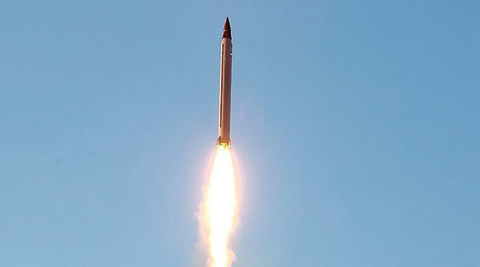LONDON/TEHRAN: Iran has extended the range of its land-to-sea ballistic missiles to 700 km, a senior Iranian military official said yesterday, amid rising tensions with the United States over Tehran's missile program. US President Donald Trump pulled out of an international agreement on Iran's nuclear program in May and reimposed sanctions on Tehran, saying the deal was flawed because it did not include curbs on Iran's development of ballistic missiles or its support for proxies in Syria, Yemen, Lebanon and Iraq.
Iran, which says its missile program is purely defensive, has threatened to disrupt oil shipments through the Strait of Hormuz in the Gulf if the United States tries to strangle Iranian oil exports. "We have managed to make land-to-sea ballistic, not cruise, missiles that can hit any vessel or ship from 700 km," Amirali Hajizadeh, head of the Iranian Revolutionary Guards' air space division, was quoted as saying by Fars news agency.
Hajizadeh said the Guards focused on extending the land-to-sea missile's range after Iranian Supreme Leader Ayatollah Ali Khamenei asked the military a decade ago about the possibility of "hitting ships" with ballistic projectiles. He did not give details on the previous range of the missiles. In 2008, Iran displayed a ground-to-sea missile that it said could travel about 290 km. On Monday, the US special envoy on Iran, Brian Hook, said that Tehran's ballistic missile program was exacerbating tensions in Yemen, Iraq and Syria. "We are accumulating risk of regional conflict if we do not do more to deter Iran's missile proliferation in the Middle East," Hook said.
The Islamic Republic's government has ruled out negotiations with Washington over its military capabilities and dismissed US assertions that its activities in the Middle East are destabilizing. Hajizadeh said some short-range Iranian missiles had been used over the past two years in Syria's civil war, in which Iranian forces have fought in support of President Bashar Al-Assad against rebels and militants. He also said Iranian drones had carried out 700 attacks on Islamic State militant positions in Syria. Iran's Revolutionary Guards have sent weapons and thousands of soldiers to Syria to help shore up Assad during the more than seven-year-long conflict there.
"Our bomber drones have carried out 700 military operations using smart bombs against Daesh," said Hajizadeh, using the Arabic acronym for IS. "They were used in eliminating tanks, personnel carriers, cars used for suicide attacks and 23-millimetre cannons - these were targets prized by Daesh and we significantly turned the tide of battle," he added. The Guards most recently used military drones against IS targets in Syria on Oct 1, in retaliation for a deadly attack in September on a military parade in Iran's southwest claimed by the militant group.
Separately, at least 11 Iranian security personnel, including Revolutionary Guards intelligence officers, were abducted on the southeastern border with Pakistan yesterday, state media reported. The Guards blamed "terrorist groups that are guided and supported by foreign forces" for the abductions and demanded action from Pakistan. State news agency IRNA said 14 troops were seized, while local media and other sources gave the number as 11.
Pakistan's foreign ministry said the two countries were coordinating efforts to "ascertain the whereabouts of the Iranian guards". "No effort will be spared to assist our Iranian brothers in finding the Iranian guards," it said in a statement. The Iranians were "abducted between 4:00 am and 5:00 am in the Lulakdan area of the border by a terrorist group", according to IRNA. Lulakdan is a village 150 km southeast of Zahedan, capital of Sistan-Baluchistan province which has seen a long-running separatist insurgency.
The Revolutionary Guards, in a statement on their website, said operations were underway to find those responsible and called on Pakistan "to stamp out terrorists that are stationed near the border". The group kidnapped was involved in "a security operation" and included two members of the elite Revolutionary Guards intelligence unit and seven Basij militiamen as well as regular border guards, said the Young Journalists' Club (YJC), a state-owned news website, in an article that was later deleted.
Pakistani security officials told AFP they had been informed of the abduction by Iran. "We are in contact with local tribal people and are looking into it so that we can take timely action for their recovery," said a senior security official based in Quetta. Sistan-Baluchistan has long been a flashpoint, with Pakistan-based Baluchi separatists and jihadists carrying out regular cross-border raids against Iranian security posts. The province has a large, mainly Sunni Muslim ethnic Baluchi community which straddles the border. - Agencies











